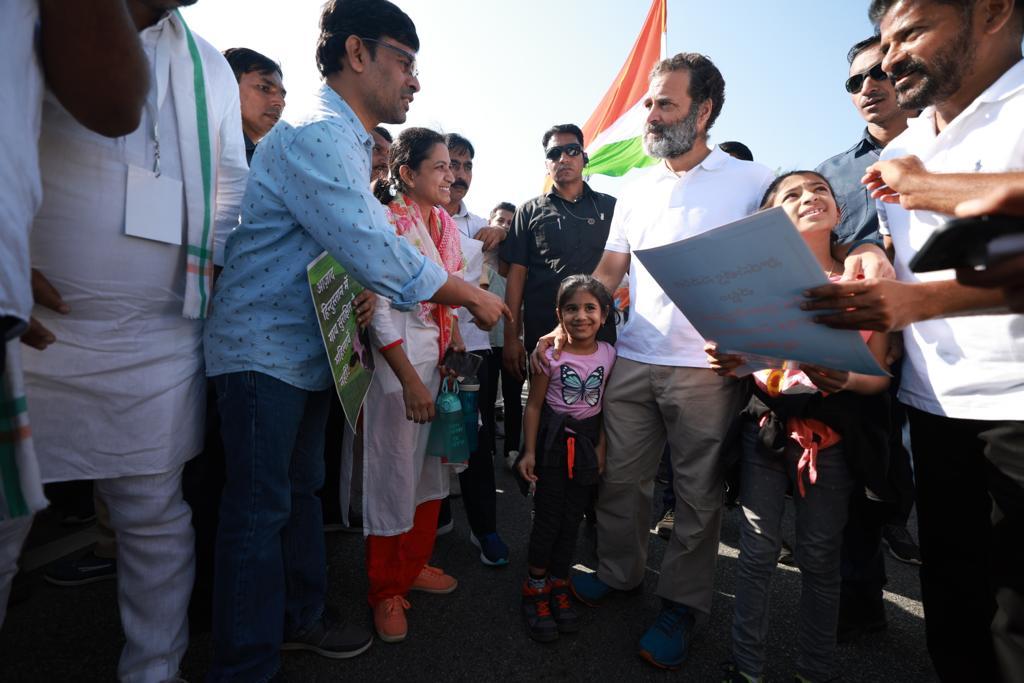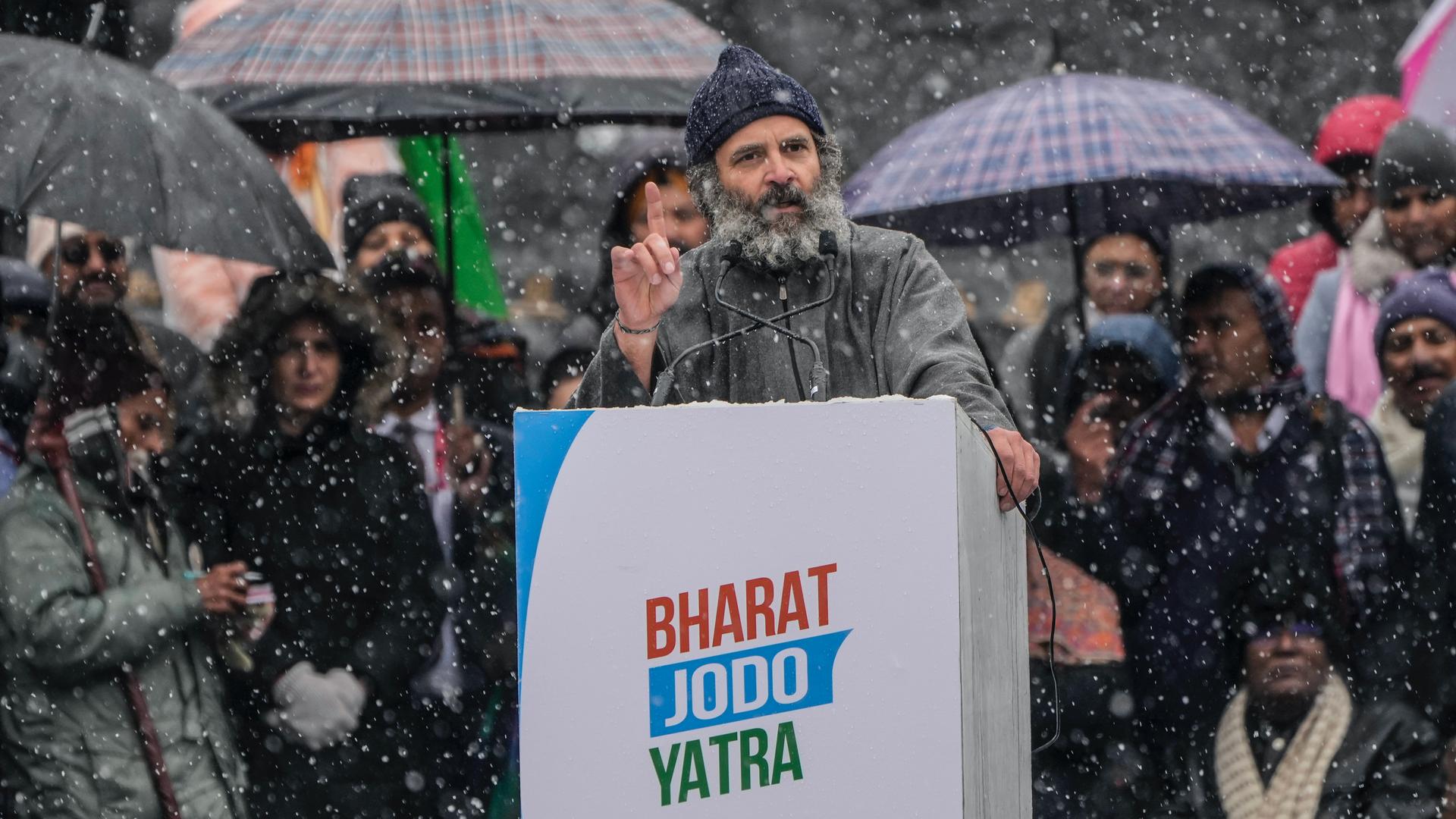Over the last five months, thousands of Indians have joined Bharat Jodo Yatra, or Unite India March, in a movement against the “politics of hate and division,” which some say are gaining force in India.
The 2,200-mile-long rally, crisscrossing the country from south to north, has been one of the most-ambitious political rallies since the country’s independence.
Rahul Gandhi, 52, the face of the Indian National Congress party, led the march that began in September of 2022 and ended on Monday in northern Kashmir. Gandhi — no relation to Mahatma Gandhi — is the biggest rival of Prime Minister Narendra Modi and his ruling Bharatiya Janata Party (BJP).
“The BJP thinks they can divide this country along religious lines, along its languages. This country cannot be divided,” Gandhi said shortly before he embarked on the long march from Kanyakumari on India’s southern tip.
Satish Kolkunda and his family joined the march on Oct. 30, bringing colorful posters and sandwiches as they met up with other marchers outside of their city of Hyderabad, in southern India.
“Why I started liking [Gandhi’s] leadership is, he’s truthful and honest,” Kolkunda said, adding that he was particularly impressed when, during a virtual meeting with party volunteers, Gandhi told them to question him if they thought he was wrong.

Gandhi is trying to drum up support for his party and, according to observers, uphold democracy in India in the face of an increasingly religious state.
“In this market of hate, I am setting up a shop of love,” Gandhi said during a speech in December in Alwar, Rajasthan.
A ‘shop of love’ in a market of hate
Kolkunda said he has witnessed firsthand the divisions that Gandhi wants to overcome.
In a WhatsApp group of his school buddies, Kolkunda said, “We have a mix of Hindus, Muslims, Christians. And that divide, I see it.”
Hindu conservatives in the group removed its Muslim members, he explained, and verbally abused them.
“And these things are happening very frequently since 2014 [when Modi first became prime minister],” he said.
Modi’s government has long been criticized for policies that put minorities, especially the country’s 200 million Muslims, at a disadvantage.
“Authorities in India have adopted laws and policies that systematically discriminate against Muslims and stigmatize critics of the government. Prejudices embedded in the government of the ruling Hindu nationalist Bharatiya Janata Party (BJP) have infiltrated independent institutions, such as the police and the courts, empowering nationalist groups to threaten, harass and attack religious minorities with impunity,” Human Rights Watch has said.
Ahead of general elections in 2024, the Congress party is positioning itself as an antidote to the BJP’s Hindu nationalist push.
Political scientist Zoya Hasan, professor emeritus at Jawaharlal Nehru University in New Delhi, said the march “has challenged frontally this idea that India is a Hindu nation. It has given people hope that there is still a place for an inclusive idea of India.”
However, some political scientists argue that the Congress party has not shied away from using religion to win votes and has itself, at times, espoused a soft brand of Hindu nationalism.
“Congress’s sustained move toward Hindu majoritarianism over several decades created fertile ground for the more extreme ideology of the BJP,” Kanchan Chandra wrote in Foreign Affairs in 2019.
Reviving the Congress party
The response to the Unite India march, Hasan said, has exceeded expectations.
“There is an indication that Congress is serious, which was not the feeling that people would have had over the last nine years,” she said. The past few years have been among the most turbulent in its history as the oldest political party instrumental in India’s independence struggle.
Some of India’s most-famous prime ministers, including Gandhi’s father, grandmother and great-grandfather, belonged to the Congress party.
But Modi’s victory in 2014 shattered the party — it won only 19% of the vote, its worst performance in history. It didn’t do much better in the next election in 2019. Today, it only holds power in three Indian states, and Gandhi himself has never been very popular.
“The Congress faces a rather existential crisis,” political commentator Rasheed Kidwai said.
And so, the Unite India march is also being seen as a Congress party revival.
While it’s too early to say whether the march will change people’s perceptions of the Congress, it has succeeded in changing people’s perceptions about Gandhi, Hasan said.
“People like the idea of a leader going to the people, rather than people going to the leader and asking something from him or her.”
Gandhi’s physical image has also transformed — he’s sporting a disheveled, salt-and-pepper beard these days, a departure from his earlier clean-shaven look.
Kidwai, who noted that Gandhi’s popularity ratings in the past have usually been in the single digits, said that he has “shown a kind of deep mental strength and a kind of sense of spiritualism” during the march.
The Gandhi family has been criticized for controlling the Congress party for many years. In October, the party selected Mallikarjun Kharge as its president, the first non-Gandhi chief in 24 years. Hasan said that that appointment and the march indicate that “Congress is turning a page.”
Bolstering democracy
A fresh start for the Congress is not only crucial for the party but also for India’s democracy. Congress is the biggest opposition party in India. The BJP’s other opponents are smaller, regional parties. In recent years, a weak Congress party resulted in the opposition becoming fragmented, which has resulted in the weakening of India’s democracy.
“Democracy without competition and a democracy without opposition is no democracy,” Hasan said. “The ruling dispensation has shown little tolerance for dissent or for opposition and would ideally want, you know, a stage where there is just minimum opposition or you just have the formality of opposition.”
Kidwai said that the march “looks high on optics but low in substance” and whether it will translate into more votes remains to be seen. “People of India are very emotional [in] their voting behavior. So, if Gandhi can find some kind of traction on that count, then that will act as a game-changer.”
While the rally was important, Hasan said, what comes after it will be even more important.
